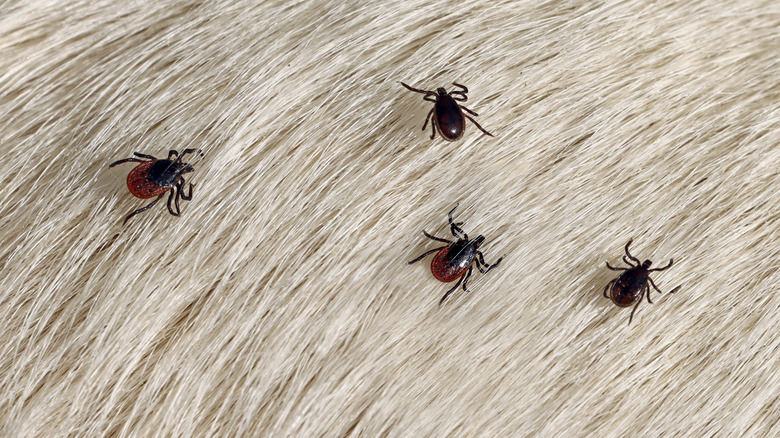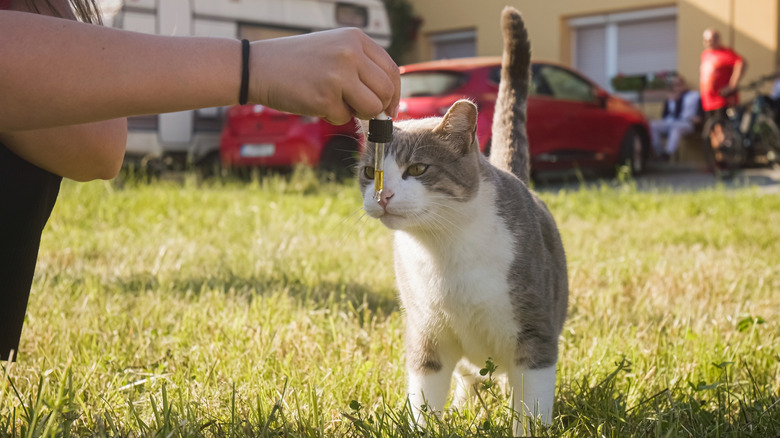The Overlooked Essential Oil Hack That Repels Fleas Like Magic
Fleas are relentless. They show up uninvited, multiply without asking, and no matter how many you kick out, more manage to sneak in anyway. You vacuum and wash everything that isn't nailed down, but they don't budge. Commercial flea treatments can be helpful in this regard, but some topical products contain ingredients that may irritate your pet's skin. Fortunately, fighting fleas doesn't have to mean using harsh chemicals or overpriced organic products in fancy packaging. There are essential oils that keep various types of pests at bay. A 2021 Brazilian study tested two essential oils, star anise and rose geranium, on fleas infesting cats and showed promising results. Both oils go straight for the fleas' weak spots and interfere with every stage of the flea's life cycle.
Star anise is loaded with E-anethole. In lab tests, it wiped out fleas across all stages: eggs, larvae, pupae, and adults. What's more, it lingered, holding onto its insecticidal powers for up to 18 days after a single application. On the other hand, rose geranium, rich in citronellol and geraniol, struck hard at lower doses. However, its residual effect was shorter. Flea-killing activity dropped to about 50% by the third day and showed no detectable insecticidal action after 13 days. So, while both oils are effective, their profiles differ. Star anise lasts longer, while rose geranium works faster but fades sooner. Despite their potential, these oils remain surprisingly underused. That's probably because natural remedies are often perceived as too gentle and less effective. If you're seeking a more plant-based approach, these oils could offer a viable solution to get rid of fleas naturally.
How to use essential oils on pets
To use these oils around pets, you'll need to get the dosage and the application right. Star anise carries a risk of neurological issues and toxicity in dogs. Since dogs frequently groom themselves and lick surfaces they come into contact with, even a small amount applied topically or to bedding can pose a risk if ingested. For this reason, it should be completely avoided for dogs unless explicitly approved by a vet. In contrast, cats may tolerate star anise when used carefully and in small amounts.
For topical use of either rose geranium or star anise on cats or rose geranium on dogs, dilute the essential oil with a carrier oil like coconut or jojoba. A safe dilution for pets is about 1 drop of essential oil mixed with 1 ½ tablespoons of carrier oil. For larger pets, you can increase the ratio safely up to 3 drops per tablespoon. To keep fleas away with a DIY repellent on your bedding or furniture, dilute 4 drops of rose geranium oil in 1 cup of water, and spray lightly over the affected areas.
Essential oils precautions for pet owners
Plant-based options can be a welcome change. Still, natural doesn't mean they don't require proper handling. Essential oils can be potent. If you're bringing star anise or rose geranium into your flea-fighting routine, you've got to know what you're doing. Even when diluted, avoid using essential oils on areas like paws, flanks, and toys that pets are more likely to lick. Instead, apply a small amount to less accessible spots, such as behind each shoulder blade and near the tail base.
If you choose to diffuse star anise or rose geranium instead of applying directly, avoid doing so in a closed room with pets present. Diffusing essential oils around confined pets can irritate their respiratory system. If they are present, make sure the room is well-ventilated and your pet can leave at any time. Additionally, be sure to monitor your pet closely after use. If you notice signs of irritation, stop immediately and contact your vet. If, however, your pet shows no adverse reactions, you can continue with occasional use as a part of your flea-prevention routine.
Always consult with your veterinarian before starting a new flea treatment, especially when it involves essential oils. Even though both oils have shown effectiveness in lab tests for cats, direct application should be avoided unless your vet approves it. Every pet's tolerance may vary based on age, breed, size, and health status.


